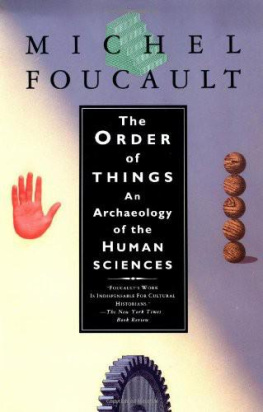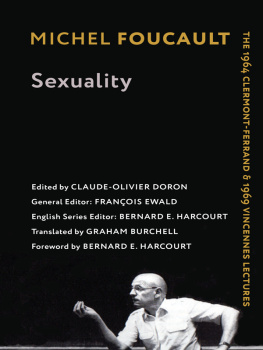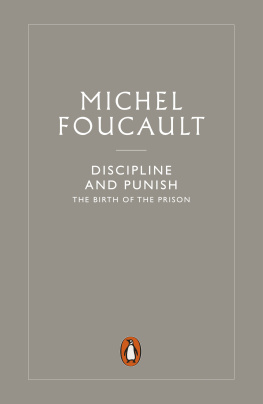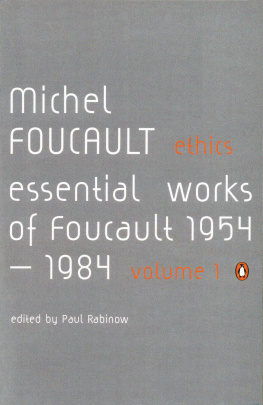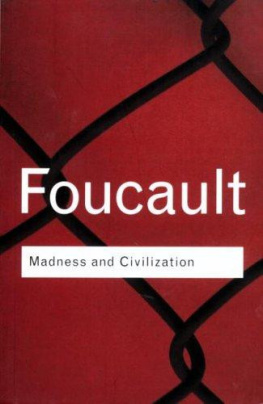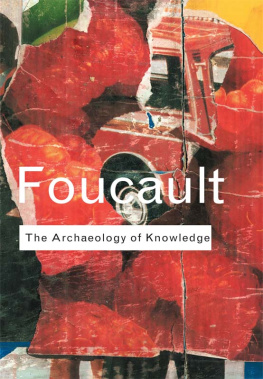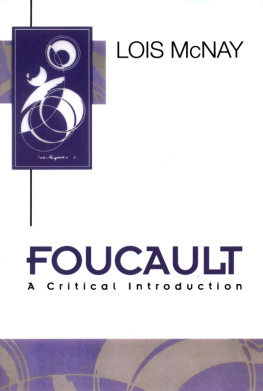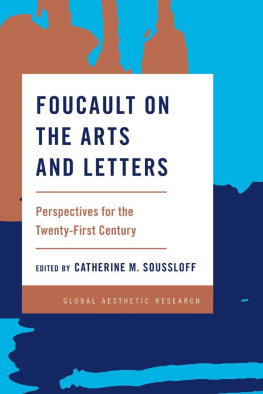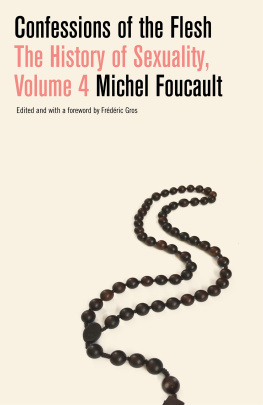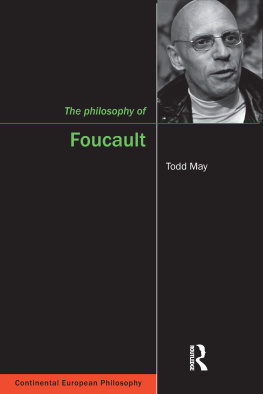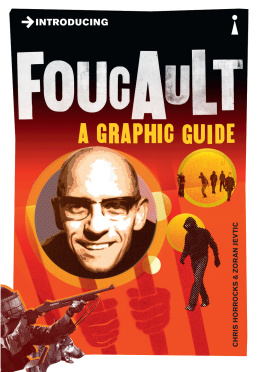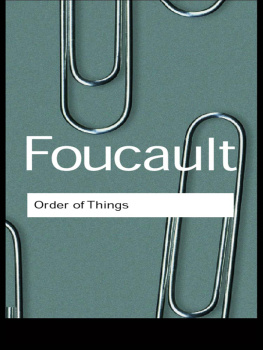VINTAGE BOOKS EDITION, APRIL 1994 Copyright 1970 by Random House, Inc.
All rights reserved under International and Pan-American Copyright Conventions.
Published in the United States by Vintage Books, a division of Random House, Inc., New York. Originally published in the United States by Pantheon Books, a division of Random House, Inc., in 1971, and in France as Les Mots et les chases by Editions Gallimard.
Copyright 1966 by Editions Gallimard, and in Great Britain by Tavistock Publications Limited.
Library of Congress Cataloging in Publication Data Foucault, Michel. The order of things.
Translation of Les mots et les choses.
Reprint of the 1971 ed. published by Pantheon Books, New York, in series: World of man. Includes bibliographical references. i. Learning and scholarship. I. Title.
Frontispiece photo 1900 by Archivi Alinari
Manufactured in the United States of America 579B864
Publisher's Note
A literal translation of the title of the French edition of this work (Les Mots et les choses) would have given rise to confusion with two other books that have already appeared under the title Words and things. The publisher therefore agreed with the author on the alternative title The order of things, which was, in fact, M. Foucault's original preference.
In view of the range of literature referred to in the text, it has not proved feasible in every case to undertake the bibliographical task of tracing English translations of works originating in other languages and locating the passages quoted by M. Foucault. The publisher has accordingly retained the author's references to French works and to French translations of Latin and German works, for example, but has, as far as possible, cited English editions of works originally written in that language.
Foreword to the English edition
This foreword should perhaps be headed 'Directions for Use'. Not because I feel that the reader cannot be trusted - he is, of course, free to make what he will of the book he has been kind enough to read. What right have I, then, to suggest that it should be used in one way rather than another? When I was writing it there were many things that were not clear to me: some of these seemed too obvious, others too obscure. So I said to myself: this is how my ideal reader would have approached my book, if my intentions had been clearer and my project more ready to take form.
1. He would recognize that it was a study of a relatively neglected field. In France at least, the history of science and thought gives pride of place to mathematics, cosmology, and physics - noble sciences, rigorous sciences, sciences of the necessary, all close to philosophy: one can observe in their history the almost uninterrupted emergence of truth and pure reason. The other disciplines, however - those, for example, that concern living beings, languages, or economic facts-are considered too tinged with empirical thought, too exposed to the vagaries of chance or imagery, to age-old traditions and external events, for it to be supposed that their history could be anything other than irregular. At most, they are expected to provide evidence of a state of mind, an intellectual fashion, a mixture of archaism and bold conjecture, of intuition and blindness. But what if empirical knowledge, at a given time and in a given culture, did possess a well-defined regularity? If the very possibility of recording facts, of allowing oneself to be convinced by them, of distorting them in traditions or of making purely speculative use of them, if even this was not at the mercy of chance? If errors (and truths), the practice of old beliefs, including not only genuine discoveries, but also the most naive notions, obeyed, at a given moment, the laws of a certain code of knowledge? If, in short, the history of non-formal knowledge had itself a system? That was my initial hypothesis - the first risk I took.
2. This book must be read as a comparative, and not a symptomatological, study. It was not my intention, on the basis of a particular type of knowledge or body of ideas, to draw up a picture of a period, or to reconstitute the spirit of a century. What I wished to do was to present, side by side, a definite number of elements: the knowledge of living beings, the knowledge of the laws of language, and the knowledge of economic facts, and to relate them to the philosophical discourse that was contemporary with them during a period extending from the seventeenth to the nineteenth century. It was to be not an analysis of Classicism in general, nor a search for a Weltanschauung, but a strictly 'regional' study.'
But, among other things, this comparative method produces results that are often strikingly different from those to be found in single-discipline studies. (So the reader must not expect to find here a history of biology juxtaposed with a history of linguistics, a history of political economy, and a history of philosophy.) There are shifts of emphasis: the calendar of saints and heroes is somewhat altered (Linnaeus is given more space than Buffon, Destutt de Tracy than Rousseau; the Physiocrats are opposed single-handed by Cantillon). Frontiers are redrawn and things usually far apart are brought closer, and vice versa: instead of relating the biological taxonomies to other knowledge of the living being (the theory of germination, or the physiology of animal movement, or the statics of plants), I have compared them with what might have been said at the same time about linguistic signs, the formation of general ideas, the language of action, the hierarchy of needs, and the exchange of goods.
This had two consequences: I was led to abandon the great divisions that are now familiar to us all. I did not look in the seventeenth and eighteenth centuries for the beginnings of nineteenth-century biology (or philosophy or economics). What I saw was the appearance of figures peculiar to the Classical age: a 'taxonomy' or 'natural history' that was relatively unaffected by the knowledge that then existed in animal or plant physiology; an 'analysis of wealth' that took little account of the assumptions of the 'political arithmetic' that was contemporary with it; and a 'general grammar' that was quite alien to the historical analyses and works of exegesis then being carried out.
Epistemological figures, that is, that were not superimposed on the sciences as they were individualized and named in the nineteenth century. Moreover, I saw the emergence, between these different figures, of a network of analogies that transcended the traditional proximities: between the classification of plants and the theory of coinage, between the notion of generic character and the analysis of trade, one finds in the Classical sciences isomorphisms that appear to ignore the extreme diversity of the objects under consideration. The space of knowledge was then arranged in a totally different way from that systematized in the nineteenth century by Comte or Spencer. The second risk I took was in having wished to describe not so much the genesis of our sciences as an epistemological space specific to a particular period.
3. I did not operate, therefore, at the level that is usually that of the historian of science - I should say at the two levels that are usually his. For, on the one hand, the history of science traces the progress of discovery, the formulation of problems, and the clash of controversy; it also analyses theories in their internal economy; in short, it describes the processes and products of the scientific consciousness. But, on the other hand, it tries to restore what eluded that consciousness: the influences that affected it, the implicit philosophies that were subjacent to it, the unformulated thematics, the unseen obstacles; it describes the unconscious of science. This unconscious is always the negative side of science - that which resists it, deflects it, or disturbs it. What I would like to do, however, is to reveal a positive unconscious of knowledge: a level that eludes the consciousness of the scientist and yet is part of scientific discourse, instead of disputing its validity and seeking to diminish its scientific nature. What was common to the natural history, the economics, and the grammar of the Classical period was certainly not present to the consciousness of the scientist; or that part of it that was conscious was superficial, limited, and almost fanciful (Adanson, for example, wished to draw up an artificial denomination for plants; Turgot compared coinage with language); but, unknown to themselves, the naturalists, economists, and grammarians employed the same rules to define the objects proper to their own study, to form their concepts, to build their theories. It is these rules of formation, which were never formulated in their own right, but are to be found only in widely differing theories, concepts, and objects of study, that I have tried to reveal, by isolating, as their specific locus, a level that I have called, somewhat arbitrarily perhaps, archaeological. Taking as an example the period covered in this book, I have tried to determine the basis or archaeological system common to a whole series of scientific 'representations' or 'products' dispersed throughout the natural history, economics, and philosophy of the Classical period.
Next page
